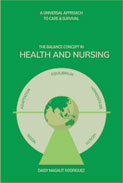
 |
The Balance Concept in Health and Nursing: A Universal Approach to Care and Survival
by Daisy Magalit Rodriguez
Daisy Rodriguez Books
Nurse and educator Rodriguez has developed a rational system for understanding human health and the nursing processes required for it, centered on the concept of balance. In Part One of this in-depth treatise, she asserts that balance is necessary for survival, encompassing how we perceive ourselves and steps we are willing to take to deal with crucial issues. The five essential elements of balance are adaptation, equilibrium, homeostasis, health, and needs. Adaptation is the ability to accept and incorporate change. Equilibrium, both psychological and physical, affects our ability to stay on track no matter the circumstances. Homeostasis is our internal, physical, regulatory system. Health is a condition of well-being as defined and experienced by each individual. Finally, needs are qualities that range from basic survival to self-actualization. Rodriguez has devised a method she calls Balance-Health Nursing Model (BHNM), detailed in Part Two, demonstrating how nursing procedures will be enhanced when all these factors are considered.
Rodriguez has meticulously researched her subject matter, offering numerous examples of each aspect of the balance concept. Every chapter ends with a numbered list of “Key Concepts” followed by “References” pertinent to the material presented. She helpfully includes scientific/physiological explanations and a lengthy case study supporting the utilization of BHNM. She also offers an experienced perspective of the way that nursing has evolved over history, citing specific sources beginning with Florence Nightingale—the progenitor of nursing as we know it—up to the current era when the role of a nurse can be seen as a process of patient assessment including observed imbalances. Specific forms and procedures facilitate the use of her BHNM template. Rodriguez’s highly intelligent contribution to the nursing field will undoubtedly be welcome for those considering or advancing through that worthy profession.